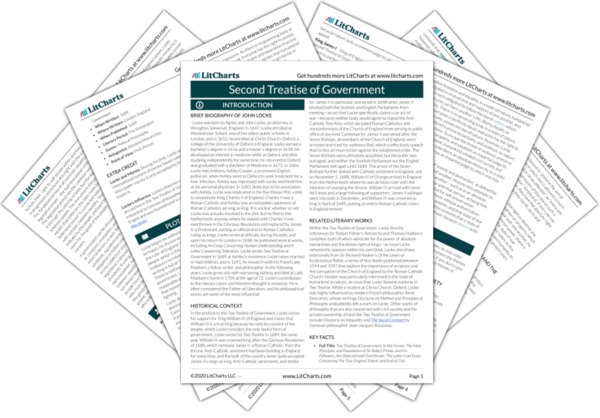State of Nature Quotes in Second Treatise of Government
But though this be a state of liberty, yet it is not a state of licence: though man in that state have an uncontrollable liberty to dispose of his person or possessions, yet he has not liberty to destroy himself, or so much as any creature in his possession, but where some nobler use than its bare preservation calls for it. The state of nature has a law of nature to govern it, which obliges every one; and reason, which is that law, teaches all mankind, who will but consult it, that being all equal and independent, no one ought to harm another in his life, health, liberty, or possessions: for men being all the workmanship of one omnipotent, and infinitely wise maker […].
And that all men may be restrained from invading others rights, and from doing hurt to one another, and the law of nature be observed, which willeth the peace and preservation of all mankind, the execution of the law of nature is, in that state, put into every man's hands, whereby every one has a right to punish the transgressors of that law to such a degree, as may hinder its violation […].
I doubt not but it will be objected, that it is unreasonable for men to be judges in their own cases, that self-love will make men partial to themselves and their friends: and on the other side, that ill nature, passion and revenge will carry them too far in punishing others; and hence nothing but confusion and disorder will follow, and that therefore God hath certainly appointed government to restrain the partiality and violence of men. I easily grant, that civil government is the proper remedy for the inconveniencies of the state of nature, which must certainly be great, where men may be judges in their own case, since it is easy to be imagined, that he who was so unjust as to do his brother an injury, will scarce be so just as to condemn himself for it.
And here we have the plain difference between the state of nature and the state of war, which however some men have confounded, are as far distant, as a state of peace, good will, mutual assistance and preservation, and a state of enmity, malice, violence and mutual destruction, are one from another. Men living together according to reason, without a common superior on earth, with authority to judge between them, is properly the state of nature.
And this puts men out of a state of nature into that of a common-wealth, by setting up a judge on earth, with authority to determine all the controversies, and redress the injuries that may happen to any member of the commonwealth; which judge is the legislative, or magistrates appointed by it. And where-ever there are any number of men, however associated, that have no such decisive power to appeal to, there they are still in the state of nature.
But though men, when they enter into society, give up the equality, liberty, and executive power they had in the state of nature, into the hands of the society, to be so far disposed of by the legislative, as the good of the society shall require; yet it being only with an intention in every one the better to preserve himself, his liberty and property; (for no rational creature can be supposed to change his condition with an intention to be worse) the power of the society, or legislative constituted by them, can never be supposed to extend farther, than the common good; but is obliged to secure every one's property, by providing against those three defects above mentioned, that made the state of nature so unsafe and uneasy.
But in governments, where the legislative is in one lasting assembly always in being, or in one man, as in absolute monarchies, there is danger still, that they will think themselves to have a distinct interest from the rest of the community; and so will be apt to increase their own riches and power, by taking what they think fit from the people: for a man's property is not at all secure, tho' there be good and equitable laws to set the bounds of it between him and his fellow subjects, if he who commands those subjects have power to take from any private man, what part he pleases of his property, and use and dispose of it as he thinks good.
He that will with any clearness speak of the dissolution of government, ought in the first place to distinguish between the dissolution of the society and the dissolution of the government. That which makes the community, and brings men out of the loose state of nature, into one politic society, is the agreement which every one has with the rest to incorporate, and act as one body, and so be one distinct common-wealth. The usual, and almost only way whereby this union is dissolved, is the inroad of foreign force making a conquest upon them: for in that case, (not being able to maintain and support themselves, as one intire and independent body) the union belonging to that body which consisted therein, must necessarily cease, and so every one return to the state he was in before, with a liberty to shift for himself, and provide for his own safety, as he thinks fit, in some other society. Whenever the society is dissolved, it is certain the government of that society cannot remain.












